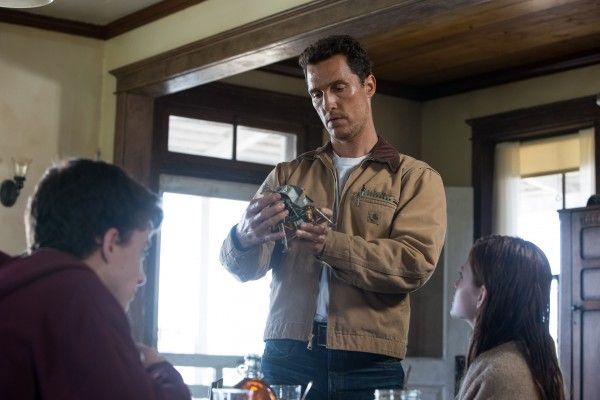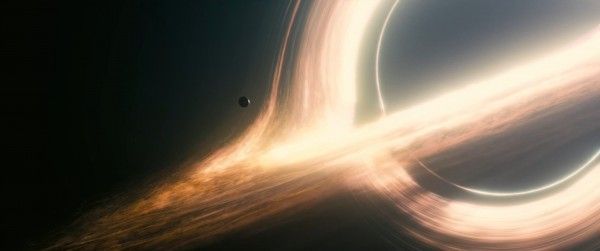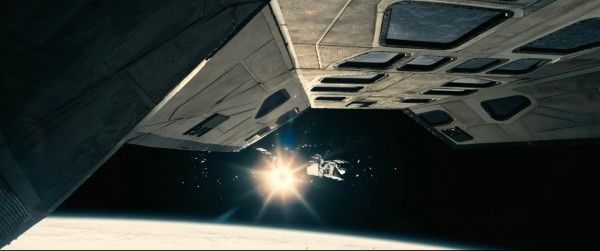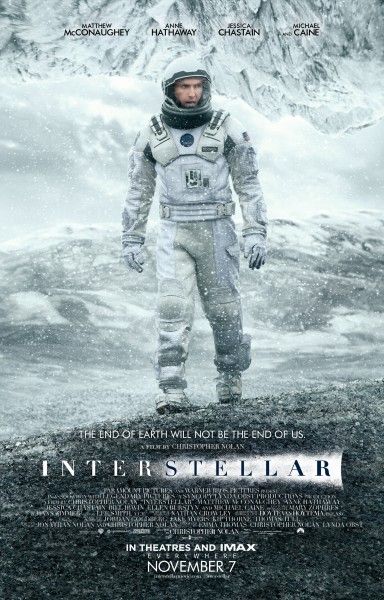"Except Christopher Nolan". That's the cinephile's refrain for a blockbuster marketplace that won't accept any bold, original ideas. No one gets to make a blockbuster film unless it's based on a pre-existing material…Except Christopher Nolan. Inception embodied this ideal, and following the conclusion of The Dark Knight Trilogy, Nolan was free to travel to anywhere he wanted to go.
His latest destination is Interstellar, a film that certainly breaks away from the traditional blockbuster in the sense of its visuals and turning scientific concepts like relativity, gravity, and time distortion into understandable dramatic plot points. Unfortunately, for all of the movie's grandeur, the voyage is constantly beset with clunky exposition, stilted dialogue, maudlin sentiment, and thinly-drawn characters. Nolan has the power to go wherever he wants, but he leaves the most valuable parts of his story in the dust.
Cooper (Matthew McConaughey) is a former pilot and engineer who now farms corn, Earth's last sustainable crop. The planet has been hit with "The Blight", which has killed almost all agriculture and ravaged the Earth with dust storms. During a storm, Cooper and his brilliant daughter Murphy (Mackenzie Foy) receive a mysterious message that leads them to a top secret mission to find a new home for humanity. Cooper joins scientists Brand (Anne Hathaway), Doyle (Wes Bentley), and Romilly (David Gyasi) on a journey through a wormhole to find a new home for the human race. Their major obstacle is the theory of relativity. An hour can equal years, so if the team spends too long on their mission, there might not be a human population left to save.
This is a movie about rescuing humankind, and yet there's little humanity in it because Nolan is always looking at the big picture rather than the details. For Nolan, humanity is nothing more than a concept, and having the father-daughter relationship between Cooper and Murphy satisfies an arbitrary standard for the emotional weight and complexity of mankind. This turns Cooper and Murphy's relationship into a shorthand rather than something we can actually believe in beyond the universally understood bond between a parent and their child. It's the crux of the plot and the themes, but it's handled in such a calculated fashion that it has all the emotional pull of a math equation despite McConaughey's best efforts to give the relationship genuine warmth and life.
Nolan is so ready to blast off that even though the movie begins with what feels like a 45-minute prologue, precious little is established beyond COOPER LOVES MURPH. The lack of definition to the world makes it feel like Interstellar takes place in an alternate reality rather than a believable future. Worldwide famine has taken a surprising and refreshing "swords-into-plowshares" approach where humankind realizes the best way to survive is to remove standing armies and invest in agriculture. The lack of food has also presumably led to stagnation in everything from technology to fashion as we see Cooper using a contemporary laptop. But it makes no sense that the world has reached the point where public schools say that the moon landing was faked and used as a piece of propaganda to bring down the Soviet Union. Nolan wants to push the notion that staying Earthbound has made us collectively dumber and less imaginative, but he doesn't present a convincing path to this argument.
"Just because" is a standard and ironic refrain from a movie that is constantly eager to celebrate science (or at least the idea of science; factually, it's apparently quite poor). A big, secret operation to head through a wormhole didn't have a pilot until Cooper unexpectedly showed up? And they're only sending four people on the voyage? This isn't an Apollo trip to see what the Moon is up to. This is the fate of mankind, and we're sending up only four people of vaguely defined professions. Is Cooper the captain of the mission or just the pilot? Is everyone multitasking? Why does Nolan introduce survivor testimonies early on and then unceremoniously drop them? Interstellar doesn't smack of laziness as much as indifference since everything else is meant to give way to the glory of the cosmos and how it's a metaphor for the transcendent power of the human spirit. "I'm making an epic sci-fi movie," Nolan seems to be saying, "So just go with it."
Nolan has taken the narrative conceit of the plot's wormhole—a shortcut through space to reach another galaxy—and applied it to the script he wrote with his brother Jonathan Nolan. It's not enough to show us the endurance of humanity and why space exploration is important. The spaceship must also be called "Endurance" and there needs to be ham-fisted conversations between Cooper and his father-in-law Donald (John Lithgow) about why space travel is important not just on a practical level, but also to our very nature as a species. The movie comes right up to the line of Nolan forgetting how people talk and instead choosing to sub in dialogue that could have come from a car commercial. The shortest distance between two places is condescending to your audience.
But here's the gift of Christopher Nolan: when the film reaches for the stars, it's unmatched. He is one of the few directors who have the talent and the resources to give us a sense of awe that blockbusters rarely provide these days. When Interstellar is firing on all cylinders—when the IMAX cinematography (to view this movie in anything but a large format would be to lose one of the picture's greatest assets), booming sound, Hans Zimmer's rousing score, and marvelous production design come together—the film is unforgettable. To mention its closest cousin, Interstellar had me clutching my armrest like I did when I saw Gravity, both films' bad science be damned.
Where Interstellar separates itself from Gravity is not only in its epic runtime (it's almost twice as long), but in trying to match the visuals and length with heavy concepts like 2001: A Space Odyssey minus the earned intellectual heft but with at least an attempt at emotional resonance (2001 is one of the most intellectually stimulating movies I've ever seen, but I don't derive one iota of emotional connection from that film). Without giving away any spoilers, Interstellar's climax presents all of the film's ambition and problems. It's the veneer of high science fiction and emotional connection, but neither one feels earned despite the magnificence and creativity of the visuals. We see the idea of what Nolan wants the movie to be, but the payoff is borderline comical because of the story's earlier shortcuts and undercutting of previously defined rules.
I deeply admire what Nolan tries to accomplish on a macro-level with Interstellar because only he has the ability to do it. All other filmmakers, no matter their talent, are shackled to pre-established brands, making the adaptations easily accessible for an international audience, and reluctantly tacking on 3D. Nolan gets to work from an original screenplay, shoot in IMAX, and do things like use the theory of relativity to create easily understood dramatic stakes in a picture that celebrates space travel. Buried beneath the poor dialogue, bland characters, and narrative leaps, Interstellar has a beautiful and noble goal. But burdened with so many faults and contrivances, Nolan's sci-fi epic never achieves escape velocity.
Rating: C-






